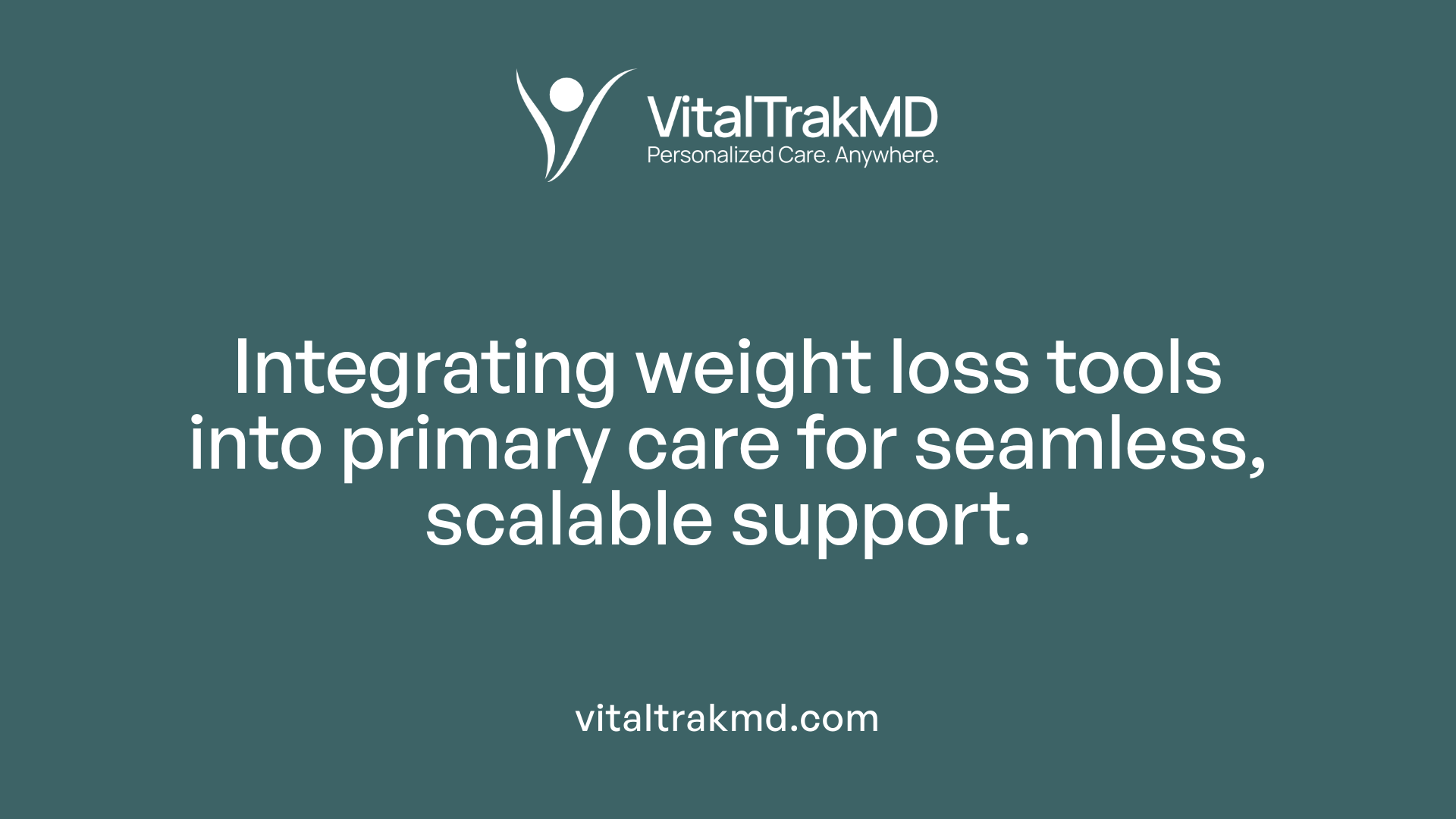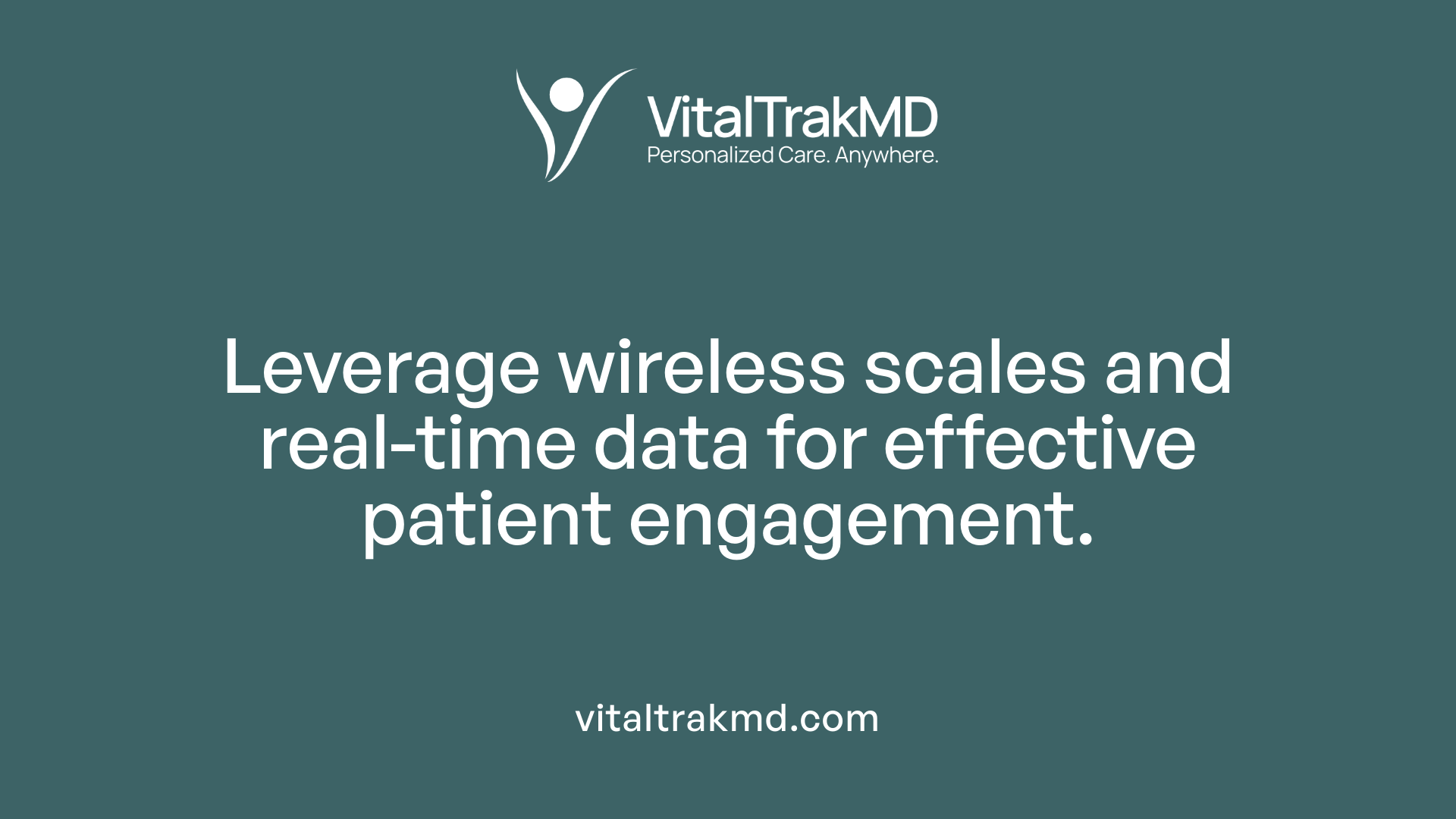Using Hybrid Programs to Track and Adjust Medication Needs

Harnessing Hybrid Programs for Enhanced Weight Management
As obesity rates continue to rise, hybrid weight loss programs that combine technology, behavioral therapy, and medication tracking emerge as promising solutions for sustainable health improvement. This article explores how integrated care models using electronic health records, telehealth coaching, and medication management optimize patient outcomes while supporting long-term wellness.
Understanding Hybrid Weight Loss Programs: The Integration of Technology and Care

What Are Hybrid Weight Loss Programs?
Hybrid weight loss programs combine traditional in-person care with digital tools and telehealth services to support sustained weight loss. These programs offer a comprehensive approach, including personalized nutrition counseling, lifestyle coaching, medication management, and psychological support, often delivered through a blend of virtual and face-to-face consultations. The hybrid model aims to make weight management more accessible, flexible, and tailored to individual needs, providing continuity of care across different settings.
How Does Electronic Health Record (EHR) Integration Enhance Delivery?
Electronic Health Records (EHR) play a crucial role in hybrid programs by embedding intervention components directly into healthcare workflows. For example, wireless scales that transmit weight data automatically sync with the patient’s EHR, allowing clinicians to monitor progress in real time. Automated messaging systems integrated with EHRs can send motivational reminders, personalized coaching tips, and referrals to nutrition or fitness support. This seamless data flow ensures coordinated care, enhances patient engagement, and supports efficient program scaling.
What Telehealth and Remote Monitoring Tools Are Used?
Telehealth platforms enable virtual consultations with healthcare providers, dietitians, and behavioral coaches, removing geographic and scheduling barriers. Remote monitoring devices such as cellular-enabled smart scales empower patients to self-weigh regularly, with data sent directly to their providers for ongoing evaluation. Programs may also use custom workout apps and tailored electronic messaging that adapt based on user engagement and progress, reinforcing healthy behavior changes.
What Are the Most Effective Wellness Programs for Sustainable Weight Loss?
Successful programs emphasize personalized dietary plans focusing on balanced nutrition and portion control, combined with physical activity suited to individual fitness levels. Behavioral techniques like self-monitoring, stress management, and goal setting strengthen adherence. Psychological support—including counseling and cognitive behavioral therapy—addresses emotional factors and builds resilience. Importantly, hybrid models foster sustainable lifestyle changes through continuous support rather than quick fixes, ultimately promoting overall physical and mental well-being.
Embedding Weight Loss Interventions into Primary Care Settings via EHR Integration

Benefits of incorporating weight loss interventions during primary care visits
Weight loss interventions embedded in primary care leverage frequent patient visits to address obesity-related health risks comprehensively. Patients with a BMI of 27 or higher and cardiovascular risk factors can receive targeted behavioral weight loss support seamlessly during office visits. This integration enables timely intervention, improves patient engagement through personalized outreach, and enhances continuity of care.
Use of automated EHR-based enrollment and randomization
The use of electronic health record (EHR) systems facilitates automated, pragmatic enrollment and randomization of patients into weight loss programs. Wireless scales that transmit weight data directly to the EHR enable continuous monitoring without manual data collection. Automated invitation messaging, adaptive emails, and nurse coaching triggered by EHR alerts support efficient patient management and personalized intervention.
Scalability and sustainability advantages
Embedding interventions within existing EHR infrastructure supports broad scalability across healthcare systems, reducing implementation barriers. The automated processes for enrollment, randomization, and data collection reduce personnel burden and increase cost-effectiveness. Integration into routine care pathways promotes sustainability, making weight management a routine part of chronic disease prevention and control.
| Aspect | Description | Benefit |
|---|---|---|
| Primary Care Integration | Incorporates weight support during regular health visits | Increases patient touchpoints and timely intervention |
| EHR-Enabled Automation | Automates enrollment, randomization, data collection | Enhances efficiency and consistency |
| Technology Support | Wireless scales and messaging integrated with EHR | Enables remote monitoring and tailored patient engagement |
| Program Scalability | Utilizes existing healthcare IT infrastructure | Facilitates expansion across diverse clinical settings |
| Sustainability | Aligns with standard care processes | Ensures long-term program viability and resource optimization |
Wireless Electronic Scales and Automated Data Transmission Enhancing Patient Monitoring

Provision of Wireless Scales for Real-Time Weight Tracking
A critical element of the intervention included distributing wireless electronic scales to patients. These scales allowed individuals to measure their weight at home and automatically record their progress without manual logging. This real-time tracking empowered patients to stay actively engaged with their weight loss goals.
Cellular Network Transmission of Data to EHR
The scales were designed to transmit weight measurements via cellular networks directly into the patients’ electronic health records (EHR). This seamless integration enabled healthcare providers to monitor patient progress remotely and in near real-time. It substantially reduced data collection burdens and improved the accuracy and timeliness of weight data.
Importance of Continuous Self-Monitoring to Patient Engagement
Regular self-weighing supported by wireless technology was linked to significant patient engagement. The automated feedback loop helped patients stay motivated, enhancing adherence to lifestyle recommendations and coaching interventions. This consistent self-monitoring is fundamental in sustaining behavioral changes necessary for effective weight management.
The combination of wireless scales and automated EHR data transmission exemplifies an innovative, scalable approach to patient-centered weight management, supporting both patients and providers in achieving better health outcomes.
Personalized Coaching Versus Basic Support: Impact on Weight Loss Outcomes

How Did Adaptive Weekly Emails and Nurse Coaching Enhance Weight Loss Support?
The study integrated a randomized group receiving customized support, including adaptive weekly emails and nurse-led coaching sessions. This approach aimed to personalize the intervention, providing tailored guidance and encouragement aligned with individual progress. The adaptive emails likely helped maintain motivation by adjusting content based on patient responses and weight trends.
What Did the Control Group Receive Compared to the Intervention Group?
In contrast, the control group was provided basic lifestyle support. This included access to standard resources for weight loss without the additional personalized coaching or adaptive messaging. Both groups received electronic scales and referral to standard lifestyle resources, but only the intervention group benefited from the enhanced communication and nurse support.
How Did Engagement and Weight Loss Outcomes Compare Between Groups?
Engagement in self-monitoring and referrals to support services was notably higher in the personalized coaching group. About 60% of participants across the study lost weight at 6 months, demonstrating preliminary effectiveness, but those receiving adaptive coaching showed enhanced engagement leading to better adherence.
While detailed comparative weight loss between groups was not explicitly quantified, the addition of adaptive emails and nurse coaching corresponded with improved patient involvement and potentially greater weight reduction, reflecting the advantages of personalized, technology-enabled behavioral support within primary care.
| Group | Intervention Components | Engagement & Weight Loss Outcomes |
|---|---|---|
| Personalized Coaching | Weekly adaptive emails + nurse coaching | Higher engagement, better adherence, potential for greater weight loss |
| Control Group | Basic lifestyle support | Lower engagement, standard weight loss rates |
This evidence underscores the value of combining automated messaging with personalized nurse support to foster meaningful weight loss outcomes in clinical settings.
Patient Engagement and Feasibility of Hybrid Weight Loss Programs
How were enrollment and randomization processes conducted?
The study implemented automated, electronic health record (EHR)-based procedures for enrollment and randomization, which proved both feasible and acceptable to patients. Invitations were sent via MyChart, a patient portal linked with the EHR, enabling pragmatic enrollment directly within primary care settings. This approach streamlined participant inclusion and allowed for seamless integration into existing healthcare workflows.
Was weight data collection through technology effective?
Wireless electronic scales were distributed to participants to transmit weight data via cellular networks directly to the EHR system. This method demonstrated strong feasibility for consistent and reliable weight tracking, facilitating real-time monitoring by clinicians. Patients actively engaged in self-weighing, and those receiving tailored messaging and nurse coaching showed enhanced participation, underscoring the acceptability of technology-assisted data collection.
What were participation rates and weight loss outcomes?
Out of 426 patients invited, 80 expressed interest, indicating considerable initial engagement in the program. At six months, 48 participants (about 60% of those engaged) had lost weight, and 12 individuals (15%) achieved a weight loss of 5% or more. These outcomes suggest preliminary effectiveness of the hybrid program combining automated messaging, telephonic coaching, and EHR integration.
This hybrid, technology-enabled strategy supports scalable weight loss interventions within primary care, leveraging automated systems to improve patient access and adherence while collecting meaningful clinical data.
Intensive Lifestyle Interventions: Clinical Benefits and Weight Management
How do intensive lifestyle interventions impact cardiovascular risk factors?
Intensive lifestyle interventions (ILIs) significantly improve cardiovascular risk factors such as blood glucose levels, blood pressure, and cholesterol. These programs promote sustainable weight loss and encourage healthy behaviors that contribute directly to reducing the risk of cardiovascular disease.
What moderate weight loss contributes to health improvements?
Studies show that moderate weight loss, approximately 10 to 15 pounds, leads to meaningful health benefits. This level of weight reduction helps improve metabolic markers, making it easier to control chronic conditions like diabetes and hypertension, and improves overall cardiovascular health.
How can ILIs be integrated into healthcare visit opportunities?
The high frequency of adult visits in U.S. healthcare systems creates an opportunity to embed ILIs into routine primary care. Integrating lifestyle interventions directly into electronic health records and primary care workflows enables clinicians to offer weight management support during office visits. This hybrid model combines technology, coaching, and clinical care to enhance patient engagement and sustainability of behavior changes.
Medication-Assisted Weight Loss: GLP-1 Drugs in Hybrid Programs
How Are FDA-Approved Medications Like Semaglutide and Tirzepatide Used in Weight Loss Programs?
In modern weight management programs, medications such as Semaglutide (marketed as Ozempic® and Wegovy®) and Tirzepatide (known as Mounjaro® and Zepbound®) play a crucial role. These GLP-1 receptor agonists help regulate appetite and improve metabolic health, supporting patients in achieving sustainable weight loss. Their use is carefully managed within clinical settings like Orchid Wellness, where comprehensive lab work is conducted beforehand to tailor treatment plans for safety and effectiveness.
How Does Combining GLP-1 Medications with Lifestyle Support Improve Outcomes?
Clinical evidence indicates that combining GLP-1 medications with structured lifestyle interventions significantly improves weight loss outcomes. For example, CVS Health's Weight Management program integrates medication with personalized nutrition planning and behavioral coaching in a virtual environment. Participants using GLP-1s alongside lifestyle changes nearly doubled their weight loss, with average reductions exceeding 15% of body weight. This approach aligns with clinical trials showing that medication effectiveness is enhanced when paired with dietary and behavioral support.
What Role Does Medication Management Play in These Hybrid Weight Loss Programs?
Medication management is a core component of hybrid weight loss programs, ensuring that pharmacologic treatment complements lifestyle modifications. At Orchid Wellness, individualized plans include medication, nutrition counseling, and lifestyle coaching, supported by regular virtual visits with advanced practice providers and registered dietitians. This coordinated approach optimizes patient outcomes, maintains engagement, and addresses holistic needs including mental health support. Additionally, programs emphasize insurance navigation and accessibility, advancing equitable weight management care.
| Medication | Role in Weight Loss Program | Supporting Lifestyle Components |
|---|---|---|
| Semaglutide (Wegovy®) | Appetite regulation, metabolic support | Nutrition counseling, exercise coaching |
| Tirzepatide (Mounjaro®) | Enhanced glucose control, weight reduction | Behavioral coaching, self-monitoring tools |
| Medication Management | Tailoring and monitoring medication use | Virtual care visits, personalized plans |
These hybrid programs demonstrate that integrating FDA-approved drugs with technology-enabled, patient-centered lifestyle support yields promising results and scalability in weight management.
Comprehensive Lab Work and Personalized Treatment Planning
Importance of Baseline Lab Assessments
Before initiating any medical weight loss program, comprehensive lab work is essential. These baseline assessments provide critical data on a patient’s overall health, including markers such as blood glucose, lipid profiles, and kidney and liver function. Understanding these parameters helps identify any underlying conditions and cardiovascular risk factors that might influence weight loss strategies.
Tailoring Medication and Lifestyle Plans
Using detailed lab results, healthcare providers can tailor weight loss treatments to each individual's needs. This includes deciding on the appropriateness of FDA-approved medications like Semaglutide or Tirzepatide and customizing lifestyle coaching and nutrition plans. Personalized plans ensure that both medication and behavioral interventions work synergistically to maximize outcomes while accommodating the patient's unique health profile.
Ensuring Safety and Efficacy of Interventions
Safety is paramount in weight management programs. Comprehensive lab work allows clinicians to monitor for potential contraindications or side effects before and during treatment. Continuous monitoring ensures interventions remain effective and safe over time, allowing for adjustments as needed. This personalized approach promotes sustainable weight loss while minimizing health risks, creating a foundation for long-term success.
Holistic Support: Nutrition Counseling, Lifestyle Coaching, and Mental Health Integration
How do care programs support long-term health and wellness?
Care programs promote lasting health improvements by providing personalized, continuous support designed to help individuals maintain healthy behaviors over time. These programs utilize a multidisciplinary approach that includes medical management, nutrition counseling, lifestyle coaching, and mental health support. Such integration allows for tailored interventions that adapt to each person’s evolving needs.
Holistic approaches to weight management
Successful weight management programs, like those offered by Orchid Wellness and CVS Health, emphasize a combination of medication, nutrition, exercise, and behavioral strategies. For example, patients receive individual plans incorporating FDA-approved medications alongside lifestyle coaching and access to fitness resources. This comprehensive methodology ensures participants have tools to achieve sustainable weight loss, typically averaging 3-4 pounds weekly with structured support.
Incorporation of mental health support
Mental health plays a crucial role in weight loss and overall wellness. Programs integrate psychological approaches such as Cognitive Behavioral Therapy (CBT) and behavioral coaching, which include journaling, mindfulness, and thought diaries. This support helps address emotional and psychological barriers to weight loss, improving long-term adherence and well-being. Therapy before and after bariatric surgery further assists in managing body image and sustaining results.
Role of nutrition and exercise counseling
Nutrition counseling coupled with lifestyle coaching forms the cornerstone of these programs. Participants get guidance on balanced eating patterns and meal planning while also accessing personalized workout apps and fitness referrals. This dual focus on diet and physical activity fosters healthier habits and contributes to reductions in cardiovascular risks and improvements in blood glucose, blood pressure, and cholesterol.
By combining these elements, holistic programs create an environment where comprehensive care promotes consistent healthy behaviors, enhances medication effectiveness, and ultimately supports long-term wellness.
| Component | Description | Example Implementation |
|---|---|---|
| Nutrition counseling | Individualized dietary advice and meal planning | Personalized nutrition plans, custom workout apps |
| Lifestyle coaching | Behavioral support to promote healthy habits | Telephonic coaching, automated motivational messages |
| Mental health support | Psychological interventions addressing barriers | CBT, mindfulness, therapy pre/post surgery |
| Medical management | Use of FDA-approved medications and lab monitoring | GLP-1 medications like Semaglutide, lab work at Orchid Wellness |
| Continuous monitoring | Tracking weight and health metrics via technology | Wireless scales integrated with EHR, virtual check-ins |
Role of Behavioral Therapy in Sustaining Weight Loss and Supporting Medication Adherence
What role does behavioral therapy play in weight loss care programs?
Behavioral therapy is essential in weight loss care programs, focusing on the psychological and behavioral components of obesity. It uses strategies like self-monitoring, goal setting, and relapse prevention to help patients make lasting lifestyle changes.
Behavioral therapy techniques in weight management
Patients engage in activities such as journaling, thought diaries, and mindfulness exercises to increase self-awareness of their eating and activity patterns. Therapy sessions—either individual or group—help identify emotional triggers and environmental cues that lead to unhealthy habits, while developing coping skills to overcome these barriers.
Self-monitoring, goal setting, relapse prevention
Self-monitoring through tools like wireless scales transmitting weight data allows patients to track progress in real-time, enhancing accountability. Setting realistic weight loss goals and building a plan for relapse prevention supports steady progress and helps patients handle setbacks without losing motivation.
Enhancing motivation and lifestyle modifications
Behavioral therapy techniques increase patients' motivation to adhere to diet, exercise, and medication regimens. Integrating psychological support before and after interventions, including medication use and surgery, optimizes outcomes by addressing mental health factors and body image concerns.
In sum, behavioral therapy complements medication-based weight loss by promoting adherence and sustainable health behaviors, making it a crucial component of multidisciplinary obesity care programs.
Virtual and In-Person Hybrid Models Increasing Accessibility and Convenience

Offering hybrid consultations to widen reach
Hybrid weight loss programs blend both in-person and virtual consultations, providing flexible options tailored to patients' needs. This hybrid model allows individuals to benefit from personalized care without geographic constraints.
Accessibility through virtual programs in multiple states
Programs such as those offered by Orchid Wellness extend their services virtually to patients residing in Texas, New York, and Washington, DC. This multistate virtual access removes travel barriers and fits care conveniently into patients’ daily lives.
In-person support complementing telehealth
While virtual care is a significant component, in-person visits remain vital, offering comprehensive medical assessments and direct interaction with healthcare providers. The integration of in-person and telehealth approaches ensures a holistic, patient-centered strategy that maximizes engagement and outcomes in weight management.
Case Study: Orchid Wellness Medical Weight Loss Programs
How is the Orchid Wellness Program Structured?
Orchid Wellness offers comprehensive medical weight loss programs led by healthcare professionals that blend medication, coaching, and rigorous safety protocols. Each patient undergoes comprehensive lab work before beginning the program to tailor treatment plans specifically to their needs and ensure safety.
The program combines FDA-approved medications such as Semaglutide (Ozempic®, Wegovy®) and Tirzepatide (Mounjaro®, Zepbound®) when clinically appropriate. Medication management is integrated with nutrition counseling, lifestyle coaching, and access to a customized workout app. This hybrid approach includes both in-person and virtual consultations, making weight management convenient and accessible across several states, including Texas, New York, and Washington, DC.
What Typical Weight Loss Outcomes and Safety Measures Are Observed?
Participants in the Orchid Wellness weight loss program typically lose 3-4 pounds per week with consistent participation. The approach focuses on sustainable weight loss through individualized plans that blend medication, nutrition, and lifestyle coaching.
Safety is paramount; comprehensive lab work is conducted upfront, and ongoing support by advanced practice providers and registered dietitians helps maintain wellness and address any potential issues. The program also integrates mental health support as needed, ensuring a holistic approach to weight management.
What Insurance Options and Tailored Treatment Approaches Does Orchid Wellness Offer?
Orchid Wellness strives to make weight management accessible to all budgets. Insurance options may be available to support patients enrolled in the programs. Treatment plans are highly personalized based on body mass index (BMI), medical history, and previous weight loss efforts.
Coordinated care with Privia OB/GYNs adds an extra layer of continuity and collaboration among healthcare providers, reinforcing a patient-centered, integrated model. Patients with a BMI of 25 or higher or those who have struggled with weight loss through diet and exercise alone find tailored support through this program, promoting long-term success and health improvements.
Case Study: CVS Health Weight Management Program and Impact on Medication Costs
Personalized Nutrition Planning with Registered Dietitians
CVS Health's Weight Management program offers tailored nutrition planning, delivered virtually by registered dietitians. This personalized approach helps members develop sustainable habits for long-term weight loss, enhancing the effectiveness of their overall care. The program emphasizes a comprehensive lifestyle strategy that complements medication and behavioral changes.
Integration with Pharmacy Benefits for Medication Management
A standout feature of this program is its seamless integration with existing pharmacy benefits. This allows members to coordinate their weight management medications, such as GLP-1 drugs, with supportive lifestyle and nutritional services. The program addresses the common gap where 70% of members previously used weight management drugs without complementary lifestyle support, facilitating a more holistic and effective treatment.
Significant Cost Savings on GLP-1 Medications
The program has demonstrated notable financial benefits. Clients utilizing CVS Caremark’s services reported spending up to 26% less on GLP-1 weight-loss medications due to the combined effect of lifestyle intervention and medication management. With over 3 million plan members enrolled by February 2025, this approach has led to widespread adoption and tangible cost reductions, while achieving impressive clinical outcomes such as an average body weight loss of 11.7%, with some members exceeding 20% weight loss.
This case study exemplifies how integrated weight management programs, combining personalized coaching and coordinated medication strategies, can improve health outcomes and reduce medication expenses effectively.
Efficacy of Combining GLP-1 Medications with Lifestyle Interventions
Clinical trial findings supporting combination therapy
Clinical trials consistently demonstrate that combining GLP-1 receptor agonist medications with structured lifestyle interventions produces superior weight loss outcomes compared to medication alone. This combination leverages the physiological benefits of GLP-1 drugs alongside behavioral changes in diet and physical activity to enhance weight reduction effectively.
Enhanced weight loss outcomes with multifaceted support
Programs integrating GLP-1 medications such as Semaglutide (e.g., Wegovy®) with personalized nutrition counseling, lifestyle coaching, and behavior modification have shown remarkable results. Participants receiving this combined approach often see nearly double the weight loss compared to those relying solely on medications. This success underscores the importance of comprehensive support—including telehealth coaching and automated messaging—to motivate and sustain healthy habits.
Sustained weight maintenance after medication discontinuation
Notably, sustained weight maintenance is achievable even after discontinuation of GLP-1 medications when robust lifestyle support accompanies medical treatment. Studies reveal that patients who ceased medication maintained up to 94% of their weight loss six months post-treatment, highlighting the durability of behavior-based weight management strategies. This sustained effect reinforces the value of embedding continuous coaching and self-monitoring tools within intervention programs for long-term success.
Technology-Enabled Monitoring and Adaptive Messaging to Support Behavior Change
How does automated messaging increase patient engagement?
Automated messaging plays a critical role in enhancing patient engagement in weight loss programs. In the study, patients receiving customized, adaptive weekly emails alongside nurse coaching demonstrated higher levels of engagement compared to those receiving only basic lifestyle support. These messages helped maintain motivation and adherence by delivering timely, personalized content that responded to individual progress and challenges.
What role do patient portals like MyChart play in communication?
Patient portals such as MyChart serve as essential platforms for seamless communication between patients and healthcare providers. In the intervention, patients were sent electronic messages through MyChart encouraging weight loss goals and providing access to resources for self-monitoring and lifestyle coaching. This integration allowed for direct, convenient outreach, supporting patient-centered care within the primary care setting.
How do these technologies impact adherence and self-monitoring practices?
The use of wireless electronic scales transmitting weight data to the electronic health record (EHR) combined with automated messaging systems significantly improved adherence to self-monitoring practices. Patients were empowered to track their progress regularly, and the real-time data sharing enabled timely feedback and coaching. The preliminary results showed that 60% of participants lost weight at six months, with enhanced engagement observed particularly among those receiving personalized support. Together, these technology-enabled strategies foster sustained behavior change and may increase the scalability and sustainability of weight management programs.
Mental Health and Weight Loss: Psychological Strategies in Hybrid Programs
How are physical health improvements linked to mental well-being in weight loss programs?
Improvements in physical health through weight loss often lead to significant positive effects on mental well-being. Weight management efforts such as exercise and dietary changes are associated with reduced symptoms of mental health conditions like anxiety and depression. Participants not only experience physical benefits but also enhanced mood, self-esteem, and overall psychological health.
What psychological strategies like CBT, journaling, and mindfulness are used in weight loss?
Hybrid weight loss programs often incorporate psychological techniques to support lasting lifestyle changes. Cognitive Behavioral Therapy (CBT) is frequently utilized to help individuals identify and modify behaviors and thought patterns that hinder weight loss. Journaling and thought diaries serve as tools for self-monitoring, promoting awareness of triggers and emotional eating.
Mindfulness exercises encourage participants to develop a present-focused awareness, reducing stress and improving self-control around food choices. These psychological modalities complement lifestyle coaching by addressing the mental and emotional aspects of weight management.
Why is therapy support important before and after bariatric surgery?
Therapy plays a critical role both before and after bariatric surgery. Prior to surgery, psychological support helps patients prepare mentally by addressing body image concerns and emotional readiness. Post-surgery, therapy assists patients in coping with lifestyle adjustments and maintaining weight loss.
Behavioral counseling before and after surgery also tackles potential psychological challenges, reducing the risk of weight regain and promoting healthier long-term outcomes. This holistic approach ensures that weight loss efforts are sustainable and psychologically supported.
Coordinated Care Models Enhancing Continuity Across Healthcare Providers
How does collaboration with specialists such as OB/GYNs improve weight management?
Effective weight management programs are increasingly emphasizing collaboration with specialists, including OB/GYNs, to ensure comprehensive and continuous care. Coordinated care models facilitate communication between primary care providers, weight loss specialists, and OB/GYNs, improving the management of patients' overall health and tailoring weight loss strategies to individual needs, especially for women in different life stages.
What role do coordinated care models play in bridging gaps between chronic disease management and weight loss?
Integrating weight management into chronic disease management is crucial to improving patient outcomes. Coordinated care models allow weight loss programs to connect with chronic disease services, providing holistic treatment plans that address both weight and associated conditions like cardiovascular risks and diabetes. This holistic approach ensures that interventions are synchronized, reducing fragmentation and enhancing effectiveness.
How do platforms like Iron Health support coordinated care?
Platforms such as Iron Health act as virtual hubs bridging gaps across healthcare services, particularly for women’s health. They provide a seamless interface that connects chronic disease management, behavioral health, and nutrition counseling. By centralizing these services, Iron Health supports coordinated care models that enhance patient engagement and streamline interdisciplinary collaboration.
These integrated approaches demonstrate that coordinated care models not only support sustained weight loss but also improve overall health outcomes by aligning multiple facets of patient care within a unified system.
Future Directions: Scaling Hybrid Programs and Integrating Emerging Technologies
What is the potential for expanding hybrid care models nationally?
The success of hybrid weight loss programs embedding technology into primary care settings signals great potential for national expansion. Programs that combine EHR-integrated tools, wireless scales, and personalized coaching have demonstrated feasibility and encouraging weight loss outcomes. Such scalable models can leverage existing healthcare infrastructure and electronic systems already widespread across US healthcare providers. Expanding these programs nationally could increase access to comprehensive weight management support, improving population health by targeting patients with elevated BMI and cardiovascular risk.
How can data collection and personalized feedback be enhanced?
Automated data collection via wireless scales and EHR systems has proven feasible in current studies, enabling seamless tracking of patient progress. Future enhancements could involve more frequent and precise monitoring of weight and behavioral data through wearable devices and mobile health apps. Personalized feedback mechanisms can be refined using adaptive messaging and telehealth coaching, fostering higher patient engagement and motivation. Tailoring support based on real-time data allows for more responsive interventions, improving patient adherence and outcomes.
How might artificial intelligence and machine learning contribute to tailored interventions?
Artificial intelligence (AI) and machine learning present exciting opportunities to tailor weight loss programs more effectively. By analyzing complex datasets from EHRs, wearable devices, and patient-reported outcomes, AI can predict individual responses to interventions and optimize coaching content. Machine learning algorithms can adapt messaging frequency and style based on engagement patterns, enhancing behavioral support. Additionally, AI-driven risk stratification could guide medication management decisions, ensuring safer and more targeted use of anti-obesity drugs such as GLP-1 receptor agonists. Integrating these technologies will enable more precise, personalized, and scalable weight management solutions nationwide.
Toward Sustainable Weight Management with Hybrid Programs
Hybrid programs that seamlessly integrate technology, personalized coaching, behavioral therapy, and medication management represent the future of effective, sustainable weight loss care. By embedding interventions into primary care workflows and utilizing tools such as wireless scales and EHR data, these approaches offer scalable solutions with significant clinical and economic benefits. Enhanced patient engagement driven by adaptive messaging and comprehensive mental health support further bolsters outcomes. As hybrid models continue to evolve across diverse populations and healthcare settings, they hold promise to transform weight management from episodic treatment to proactive, lifelong wellness.
References
- Intervention Component Design and Pragmatic Randomized ...
- Hybrid Health IT and Telehealth–Delivered Behavioral ...
- Medical Weight Loss
- Iron Health x Privia Wellness
- CVS Weight Management program improves ...
- Weight Loss Treatment Centers in Orange County, CA
- Intensive Behavioral Therapy for Obesity
- Cognitive behavioral therapy to aid weight loss in obese ...
Recent articles
Want to Feel Better and Live Healthier?
Join hundreds of patients taking control of their health with personalized care that fits their life – not the other way around.
Rated 4.8/5 by 32+ customers







